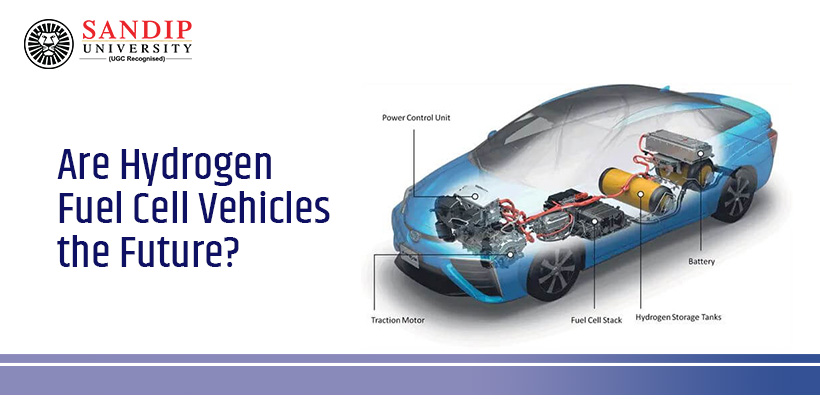Hydrogen fuel cell vehicles (HFCVs) are a type of electric vehicle that uses hydrogen gas to generate electricity to power the vehicle’s motor. HFCVs are zero-emission vehicles, meaning that they produce no tailpipe emissions. HFCVs are also very efficient, and they can travel long distances on a single tank of hydrogen.
Many top engineering colleges in India are conducting ground-breaking research on developing hydrogen-fueled vehicles to revolutionise the transportation sector on a global level.
Let us examine the benefits, challenges, and the possible solutions to incorporating hydrogen fuel cell vehicles into our transportation systems:
Benefits of Hydrogen Fuel Cell Vehicles
HFCVs offer a number of benefits over traditional gas-powered vehicles, including:
- Zero emissions:HFCVs produce zero tailpipe emissions, which can help to improve air quality and reduce greenhouse gas emissions.
- Long range:HFCVs can travel long distances on a single tank of hydrogen. Some HFCVs have a range of over 300 miles.
- Fast refueling:HFCVs can be refueled in a matter of minutes, similar to gas-powered vehicles.
- High performance:HFCVs offer high performance, with good acceleration and top speed.
Challenges of Hydrogen Fuel Cell Vehicles
HFCVs are still in their early stages of development, but they have the potential to become a major player in the transportation sector in the future. HFCVs offer a number of advantages over traditional gas-powered vehicles, including zero emissions, long range, and fast refueling.
However, HFCVs also face a number of challenges, including cost, infrastructure, and fuel production. These challenges must be addressed before HFCVs can be widely adopted.
Let us further explore these challenges below:
Cost of Hydrogen Fuel Cell Vehicles
The cost of HFCVs is expected to come down as production volumes increase. However, HFCVs are likely to remain more expensive than traditional gas-powered vehicles for some time. There needs to be additional research and development in this field to make these vehicles more cost-effective and pocket-friendly in the future.
Infrastructure
The number of hydrogen refueling stations is growing rapidly. However, there is still a limited network of hydrogen refueling stations, which is a barrier to adoption.
Fuel production
Hydrogen is not a naturally occurring fuel. It must be produced using other energy sources, such as electricity, natural gas, or renewable energy sources. This makes the production of hydrogen less environmentally friendly in the long run.
Overcoming the Challenges Faced by HFCVs
The challenges facing HFCVs can be overcome through a combination of government support, technological innovation, and private investment.
Governments can support the adoption of HFCVs by providing incentives to buyers and by investing in hydrogen refueling infrastructure. Technological innovation can help to reduce the cost of HFCVs and improve their performance. Private investment can help to expand the production of HFCVs and build new hydrogen refueling stations.
- Government support: Governments around the world are supporting the development and adoption of HFCVs. For example, the United States government has set a goal of having 500,000 HFCVs on the road by 2030.
- Technological innovation: Automakers and other companies are investing heavily in the development of new HFCV technologies. For example, Toyota has developed a new HFCV system that is more efficient and affordable than previous systems.
- Private investment: Private investors are also investing in the HFCV industry. For example, in 2022, various investors invested over $1 billion in HFCV companies.
Conclusion
Hydrogen fuel cell vehicles have the potential to become a major player in the transportation sector in the future. HFCVs offer a number of advantages over traditional gas-powered vehicles, including zero emissions, long range, and fast refueling.
However, HFCVs also face a number of challenges, including cost, infrastructure, and fuel production. These challenges must be addressed before HFCVs can be widely adopted. Some of the best engineering colleges in Maharashtra are offering undergraduate and postgraduate programs in this field to help create safer and more environmentally friendly transportation options for future generations.
The feasibility of hydrogen fuel cell vehicles is improving all the time. With government support, technological innovation driven by research and development centres, and private investment, HFCVs have the potential to become a major player in the transportation sector in the future.

